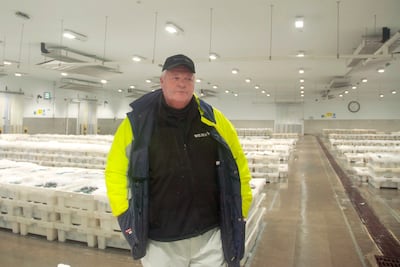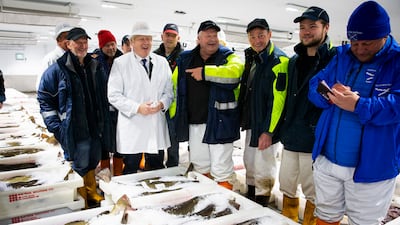On UK Prime Minister Boris Johnson’s last flying visit to Scotland’s largest fish market, he successfully bid £185 at auction for an expensive box of cod — while promising an even better long-term Brexit deal for the country’s fishermen.
“It’s a sea of opportunity up here,” said the prime minister, who bid for the crate at Peterhead fish market on the advice of local fish trader Will Clark. Two years on, Mr Clark, a Brexiteer who cheered alongside others for Mr Johnson now says he has been betrayed.
“We were sold a lie by Westminster,” he said in a break in bidding at the market, one of Europe’s largest, but operating at less than one quarter capacity when The National visited.
Mr Clark said that during Mr Johnson’s 2019 visit, he had given the prime minister his wish list for a successful Scottish fish industry based on a new relationship with Europe. He said the prime minister had failed to deliver any of it.
“They came here up here and fed on people’s aspirations,” said Mr Clark, who owns Wilsea Ltd, a seafood wholesaler. “They are charlatans and told blatant lies. I was pro-Brexit. I was one of the ones who was hoodwinked.”

Peterhead, the UK’s largest fishing port, is built in part with EU money. The sea wall outside the fish market has a plaque hailing the financial assistance received from the EU’s European Fisheries Fund and the Scottish government.
But opinion polls in the run-up to the vote showed that the fishermen who unload at the port were among the strongest backers of Brexit. They believed the 2016 vote would allow domestic trawlers to take more fish from the UK’s waters and restrict access to the EU’s fishing fleet.
The quotas were set until 2026 by a last-gasp free trade agreement struck in December 2020 after years of increasingly fractious talks. But the industry accused the UK government of failing to deliver any meaningful changes to the quota system, despite a slogan during the Brexit campaign of “taking back control".
The industry contributes only 0.02 per cent of the UK’s Gross Value Added, a measure similar to GDP. Freedom from the EU’s fisheries policy was touted as the one of the most prized benefits of leaving the economic bloc.
The fate of the industry is now seen as a bellwether in the analysis of whether Brexit turns out to be a success.
Britain’s position as an island nation, its history of clashes with fishermen from continental Europe and a series of “cod wars” in the North Atlantic with Iceland that ended in defeat for the UK in the 1970s has heightened the industry’s public and strategic significance.
Mr Johnson’s government claimed that Brexit would benefit the industry by more than £148 million by 2026 — but analysis by a former lead negotiator for the UK during the EU fishing deal with Norway suggests that the sector will be worse off by £300m over the same period.
Fishing businesses trying to export to the EU have been throttled by new administrative costs, customs and health checks, prompting the government to promise an extra £23m in January to assist with “teething problems” that have been worsened by the Covid-19 pandemic.
“The assessment shows that there are very few winners and a great many losers,” said Barry Deas, chief executive of the National Federation of Fishermen’s Organisations, which commissioned the study.
Small changes to the balance of trade since the agreement was struck have prompted warnings of retaliation from EU states. France has protested a UK refusal to issue licences for a small number of the 1,700 EU vessels allowed to operate in its waters.
Under the international law of the sea, the UK has the right to exploit its own resources and control entry to its waters. But the EU, backed by the economic heft of its 27-state membership, could retaliate with other trade measures if the UK tried to limit access to the EU fleet when it came to renegotiating quotas from 2026, said Mr Deas.
In the end, the 2020 trade agreement “came down to big power politics with fishing rights enmeshed in the wider political balance,” said Mr Deas.
“Now we have left the EU, we have taken back control of our waters,” said a representative for the UK government. “We have greater shares of fishing quota and the total value of UK-EU fishing opportunities for the UK in 2021 is approximately £333m — an increase of £27m on last year.”
The decision to leave the EU was most keenly felt in Scotland, where more than 60 per cent of the UK’s economic output from fishing is generated but where the majority of the population voted to remain in the bloc.
Britain, a net importer of fish, exports the vast majority of its catch to the EU, where the reduction of holidaymakers and the closure of restaurants because of the Covid-19 pandemic saw demand slashed last year. It worsened the long-term decline in an industry that supported 20,000 fishermen in the mid-1990s to 12,000 in 2019, UK parliamentary figures show.
There have been some winners under the 2020 deal. The pelagic fleet — which trawls for species like mackerel and sardines — benefited most from the deal, according to the NFFO analysis.
The post-Brexit decline of sterling has made their exports more profitable. “Turned millionaires into billionaires,” said Mr Clark.
Mr Clark, who buys and trades within the UK market, says he has been largely unaffected by the additional red tape. But the Scotland Food & Drink association said earlier this year that exporters could be losing more than £1m in sales a day.
Ian Napier, a buyer at the market for fish merchant Ken Cassells, said there was “massive hitch when Brexit took place” because of the extra paperwork.
The speed and lack of details before the deal was agreed to in December 2020 meant the industry was unprepared for the changes.
“It was quite frightening for most people but it seems to have settled down,” said Mr Napier.
Stephen White, the skipper of the trawler Daystar, said he experienced greater disruption from the Covid-19 pandemic than Brexit.
His crew includes Filipino sailors and restrictions on travel made it harder for them to book flights home, disrupting crew rosters for trips. The boat specialises in catching prawns, a trade that was hit hard by the closure of restaurants in Spain and Italy, he said.
But he had no faith that British politicians could deliver a better deal for the fleet in the future. He said he did not vote in the Brexit referendum as it was a “just a waste of time; they just tell lies”.
“They promised the world,” he said. “Lots of promises — right up to 10 minutes before the deal was done — and then a kick in the teeth.”


